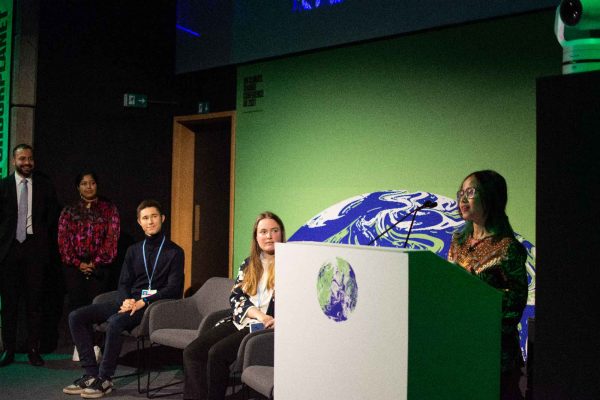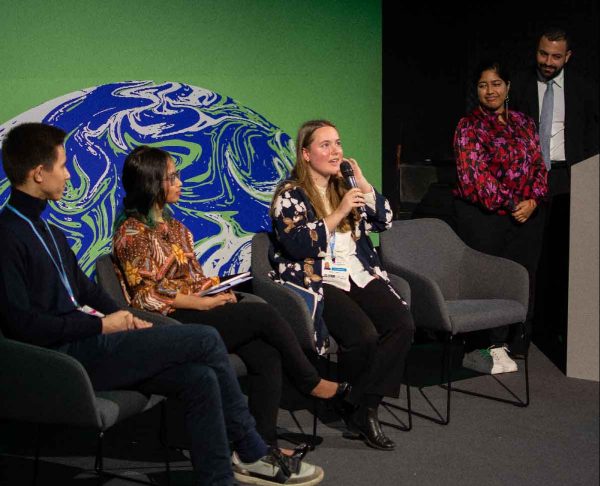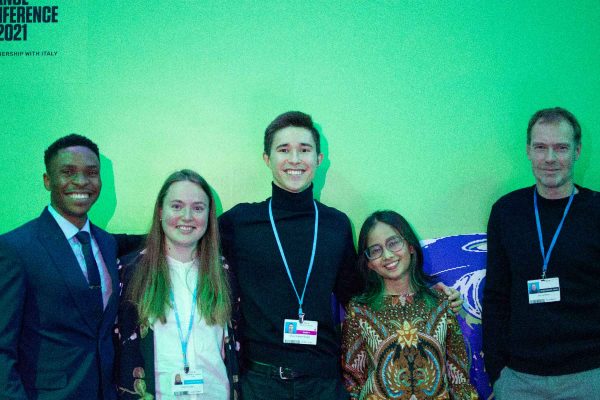Global Youth Energy Outlook: Launching Initial Insights at COP26
On November 4th at COP26, Student Energy released initial insights from the Global Youth Energy Outlook (GYEO). The GYEO is a first-of-its-kind report that outlines what nearly 42 000 young people, 18 to 30 years old, want to see for the future of energy in their region. The report was developed by a team of 12 Regional Coordinators who worked with Student Energy to conduct a global survey of nearly 42,000 diverse youth, and also hosted a series of 32 Regional Dialogues to dive deeper into specific energy issues and collect more qualitative insights.
“The GYEO is a way to bridge the communications gap that exists right now between young people calling for more, and leaders who don’t seem to be hearing or understanding what they’re asking for. “
– Helen Watts, Senior Director of Global Partnerships at Student Energy
Developing the Global Youth Energy Outlook
Since Student Energy began this global data project, two things became very clear:
- To create an Outlook that truly represented the viewpoints of young people from around the world, the Outlook needed to be led by youth
- We wanted the Outlook to be about systems change, looking beyond just policy, and technology, but at social dimensions to ensure we have a justice-centered approach to the energy transition.
To achieve this, we recruited a diverse team of 12 Regional Coordinators who have been working with Student Energy over the last 18 months, conducting community outreach in their global regions, recruiting hundreds of volunteer country ambassadors, and worked with community organizations to ensure representation across countries, urban and rural regions, and socioeconomic backgrounds. The RC’s also hosted regional dialogues, expanding on the information collected from the GYEO survey, to hear qualitative insights, lived experiences, opinions, and perspectives from youth.
Click here to view our preliminary results:
PRELIMINARY RESULTS
Our launch event included an intergenerational programme where Regional Coordinators showcased key findings and regional insights from their research, as well as pathways for decision-makers to work collaboratively with youth on setting the agenda for achieving SDG7.
Watch the full stream of our launch event:
Watch here
Key initial insights:
1. The majority of young people want their countries to take immediate and drastic climate action, commensurate to the severity and scale of the global climate crisis. This includes accelerating targets for net-zero emissions, investing and scaling solutions that transition the system away from fossil fuels, and investing skill-training and financial resources towards the young generation as leaders in climate action.

“From Regional Dialogues that I held in Southeast Asia, one line that I can derive is ‘we do not have any more time to continue with our destructive, business-as-usual path.’ We are calling for more ambitious resources, and finance mobilization towards slow carbon investment. We want to increase the renewable energy share in the global energy mix. We want to ensure universal access to affordable and clean energy. We want to see improvement in energy efficiency [moving] forward, and we would like to accelerate the decarbonization of heavy industry. As the current future work force, we aspire to have more green jobs and we demand a just and equitable transition by making sure we leave no one behind. Most importantly, we would like more adaptation actions, so we can be a climate resilient society.”
– Nabila Putri Salsabila, Regional Coordinator for Southeast Asia
2. Leaders across government and industry should actively create opportunities for young people to meaningfully engage with decision makers and in decision-making spaces. Young people want to be equal partners in developing and carrying out policies, upskilling, community organizing, and working on tangible climate solutions. It’s important for these leaders and organizations to recognize and address barriers that currently prevent young people from getting involved.

“There’s a huge gap between young people’s willingness to engage and the support they feel that they get. There’s a huge opportunity for governments and businesses and organizations to support young people, like give them the funding and the skills and the mentorship they need to bring their ideas and bring their willingness to take climate action into real solutions and real actions.”
– Linette Knudsen, Regional Coordinator for Europe
3. The GYEO highlighted important regional differences between young people from developing and emerging economies and those from higher income, developed regions. The GYEO serves as a powerful tool for governments to differentially target their strengths and shortcomings to achieve a globally just and sustainable future.
“In Latin America, youth see [government] policies as the biggest barrier to a sustainable energy future. In Africa, it is the lack of advanced technologies. If we address all of these regional differences, we will understand that governments…can carefully use this data to enhance climate education in some regions, invest more in clean energy and renewable energy resources and advance technologies in others….We still want the same sustainable future. We still want to see net-zero goals, we may have different horizons for these goals, but we all want to see a sustainable future.”
– Arsenii Kirgizov-Barskii, Regional Coordinator for Eastern Europe & Central Asia
Watch the full stream of our Launch Event at COP26, including an intergenerational dialogue [57:35] with Jonathan Wilkinson, Canada’s Minister of Natural Resources, and Jorn Verbeeck, head of Research and Innovation for the Global Covenant of Mayors, here.
